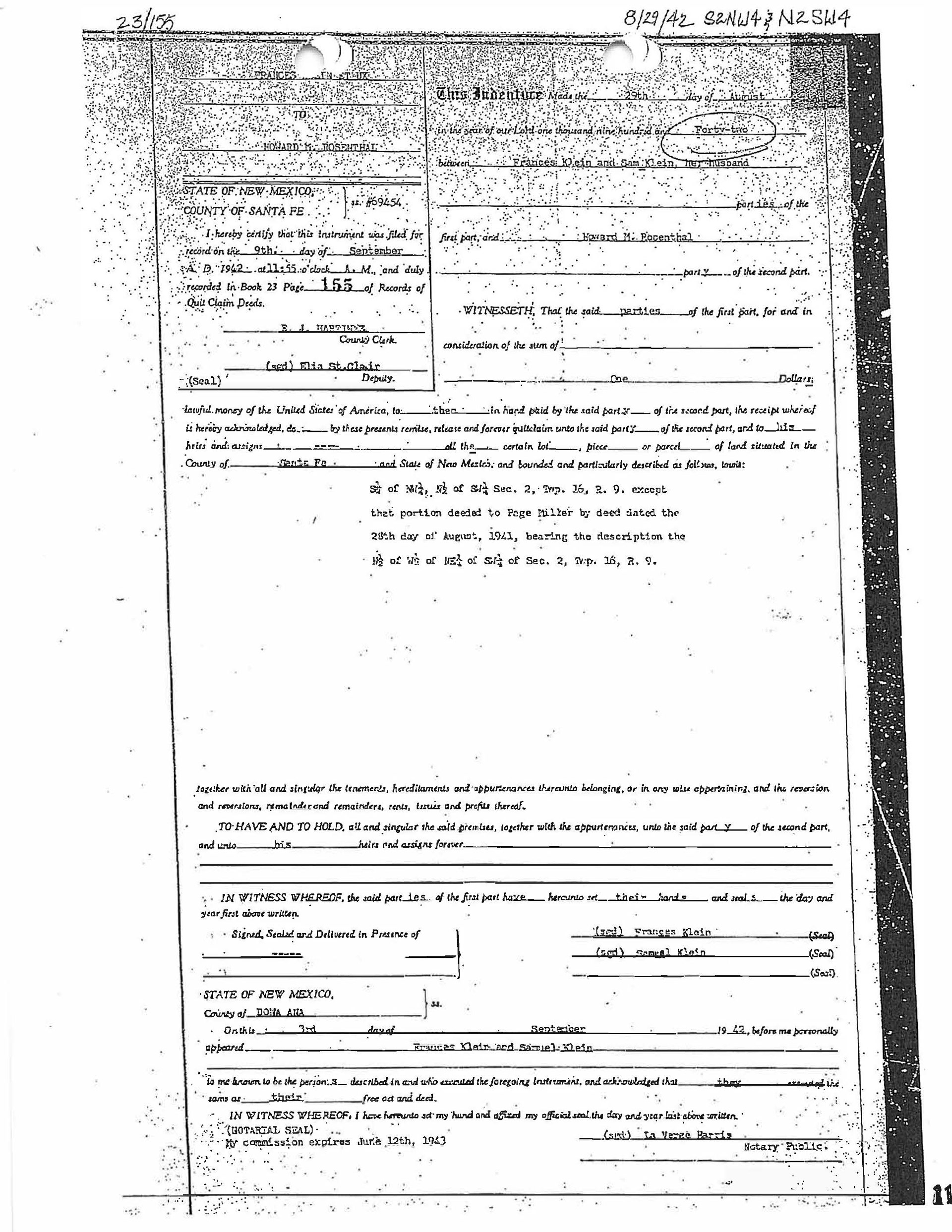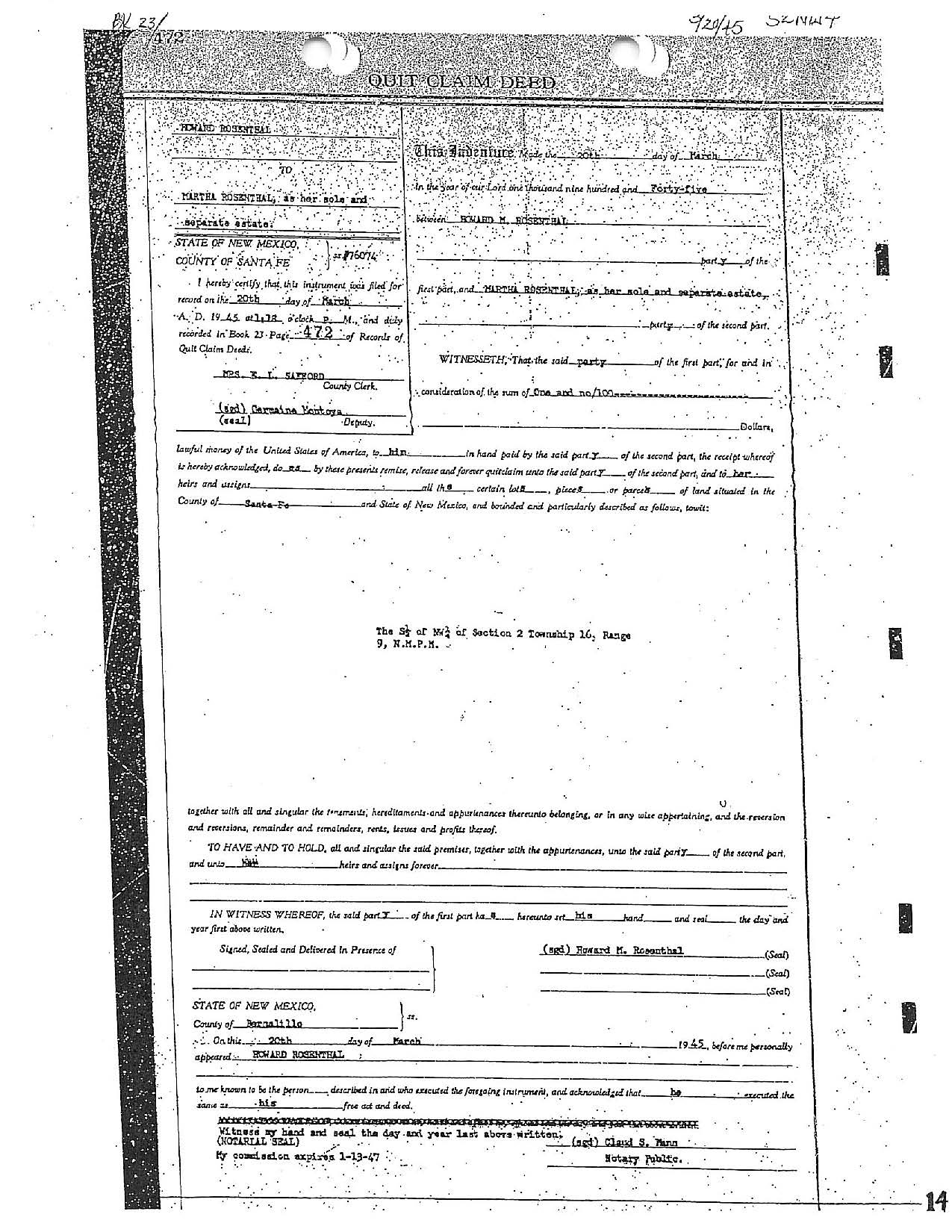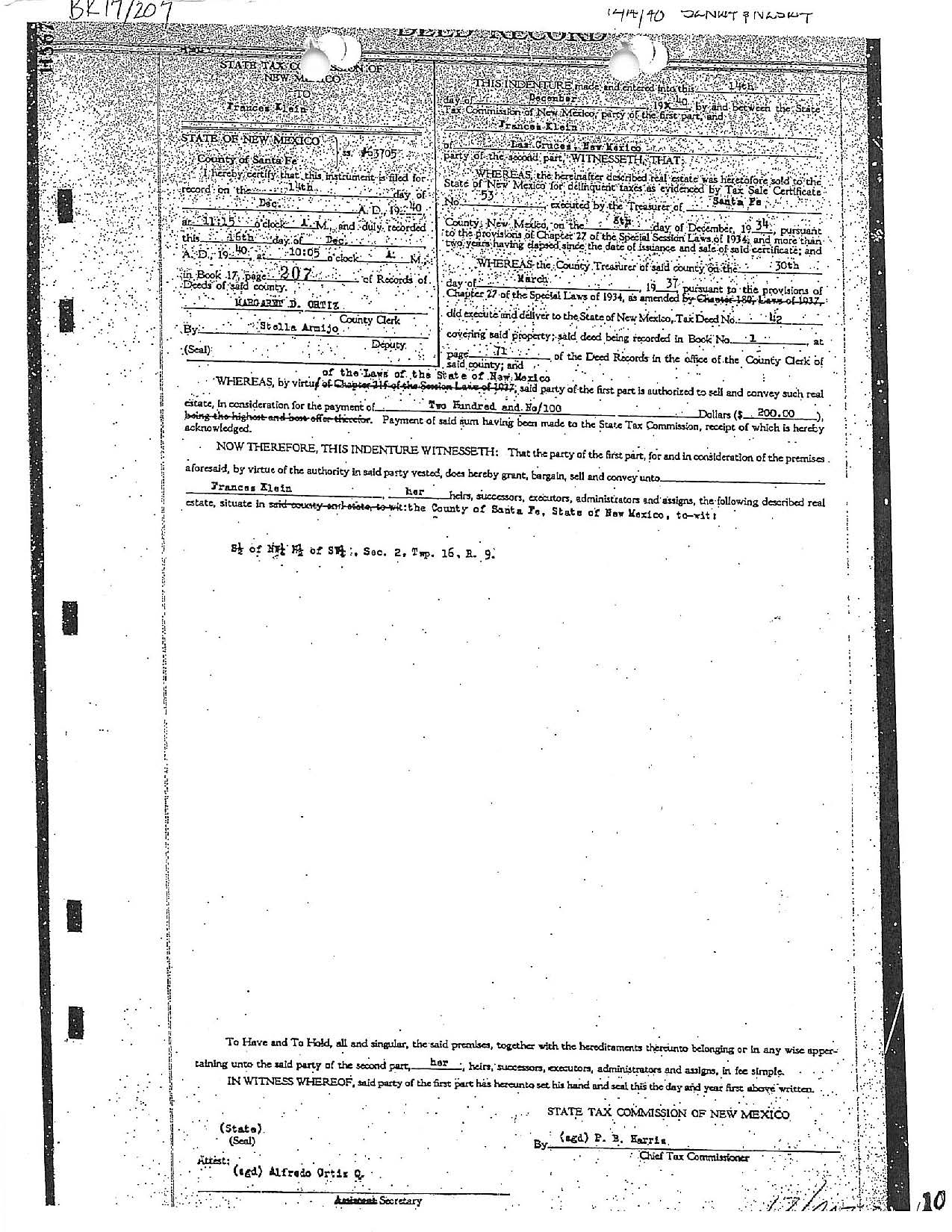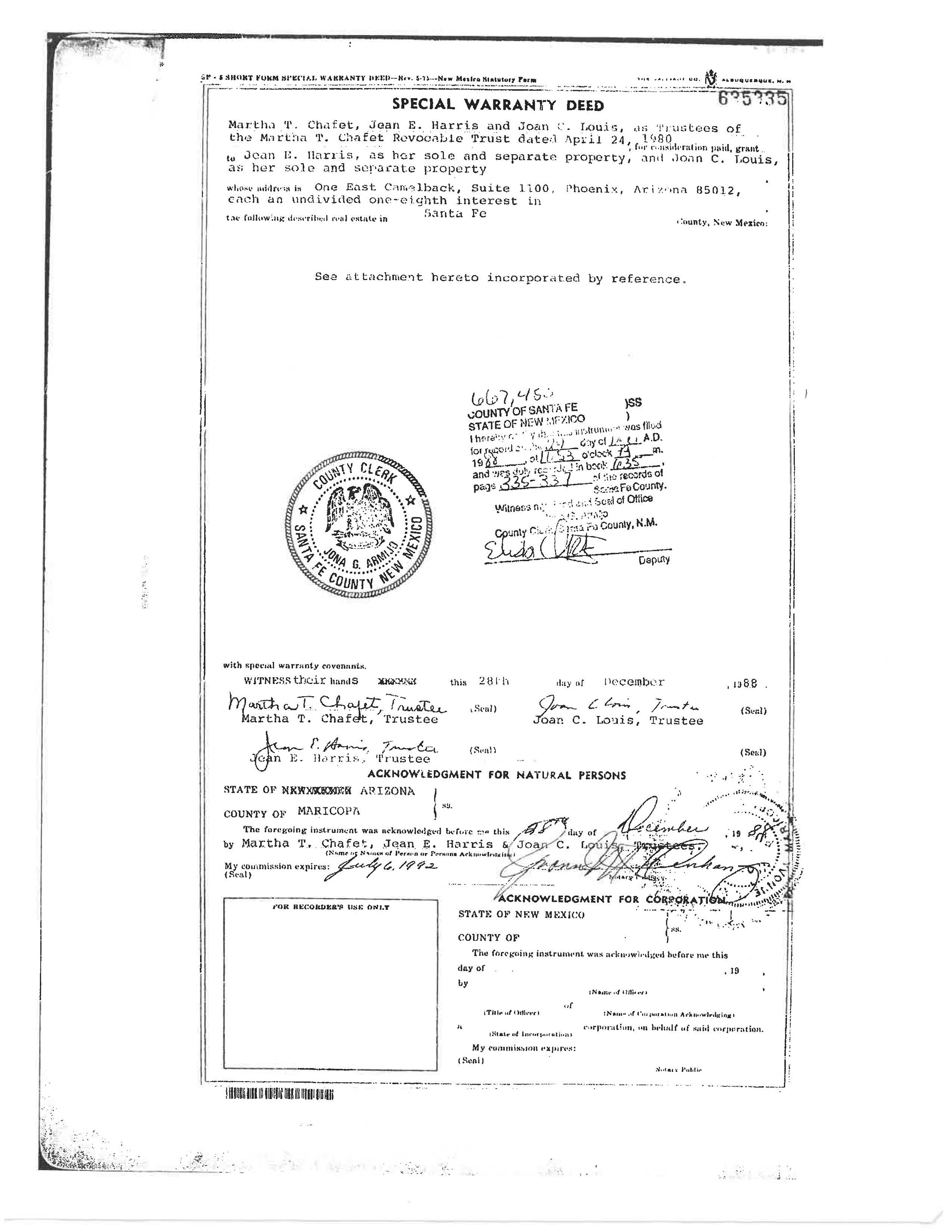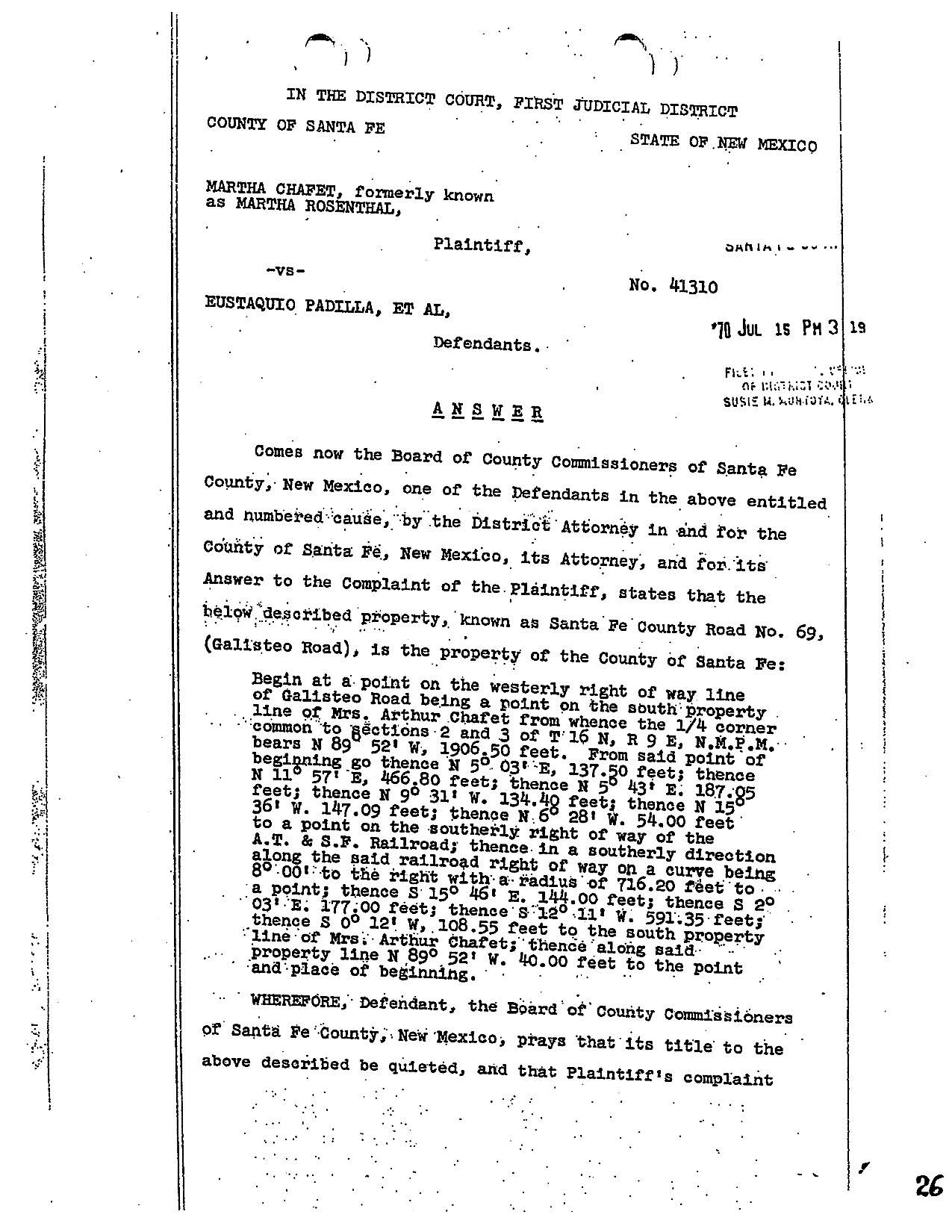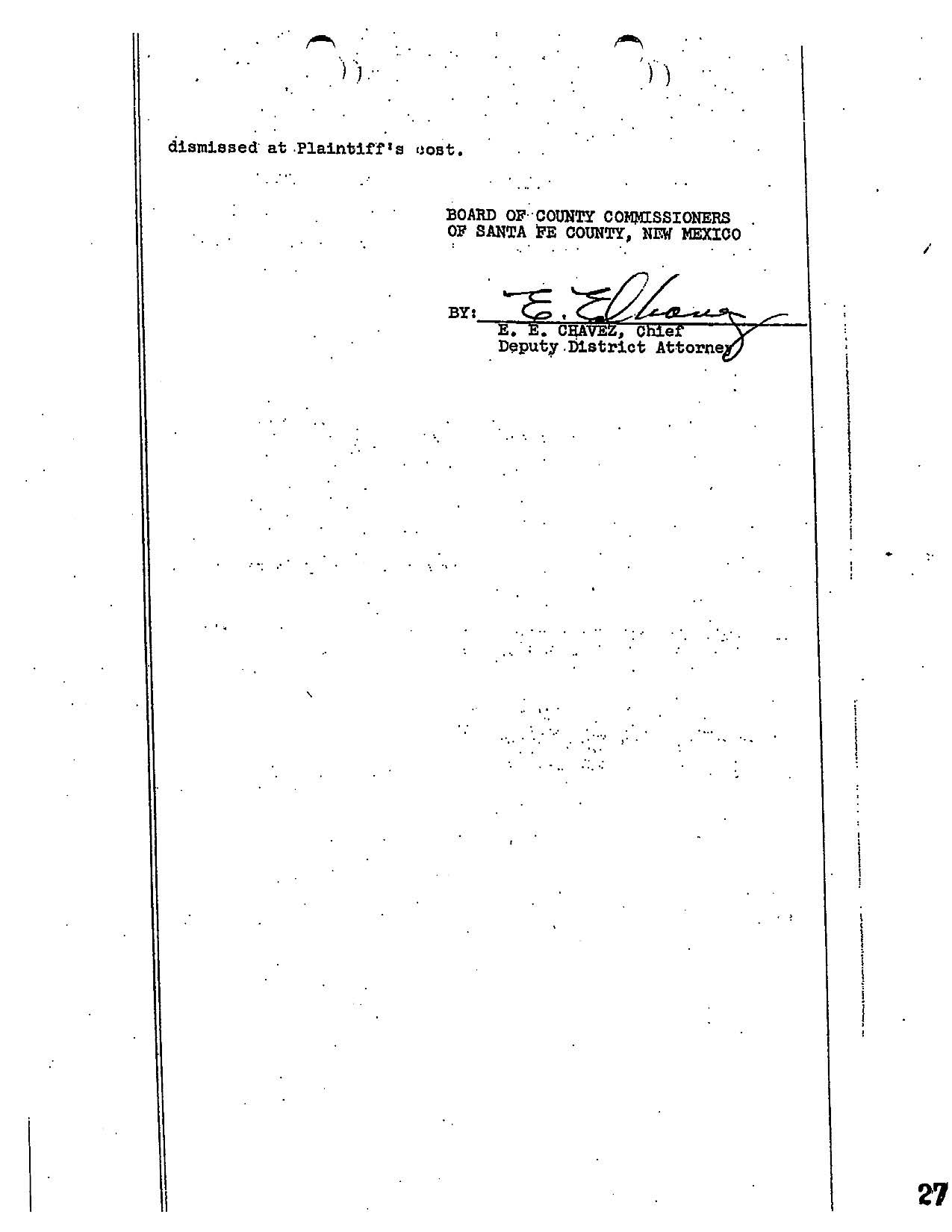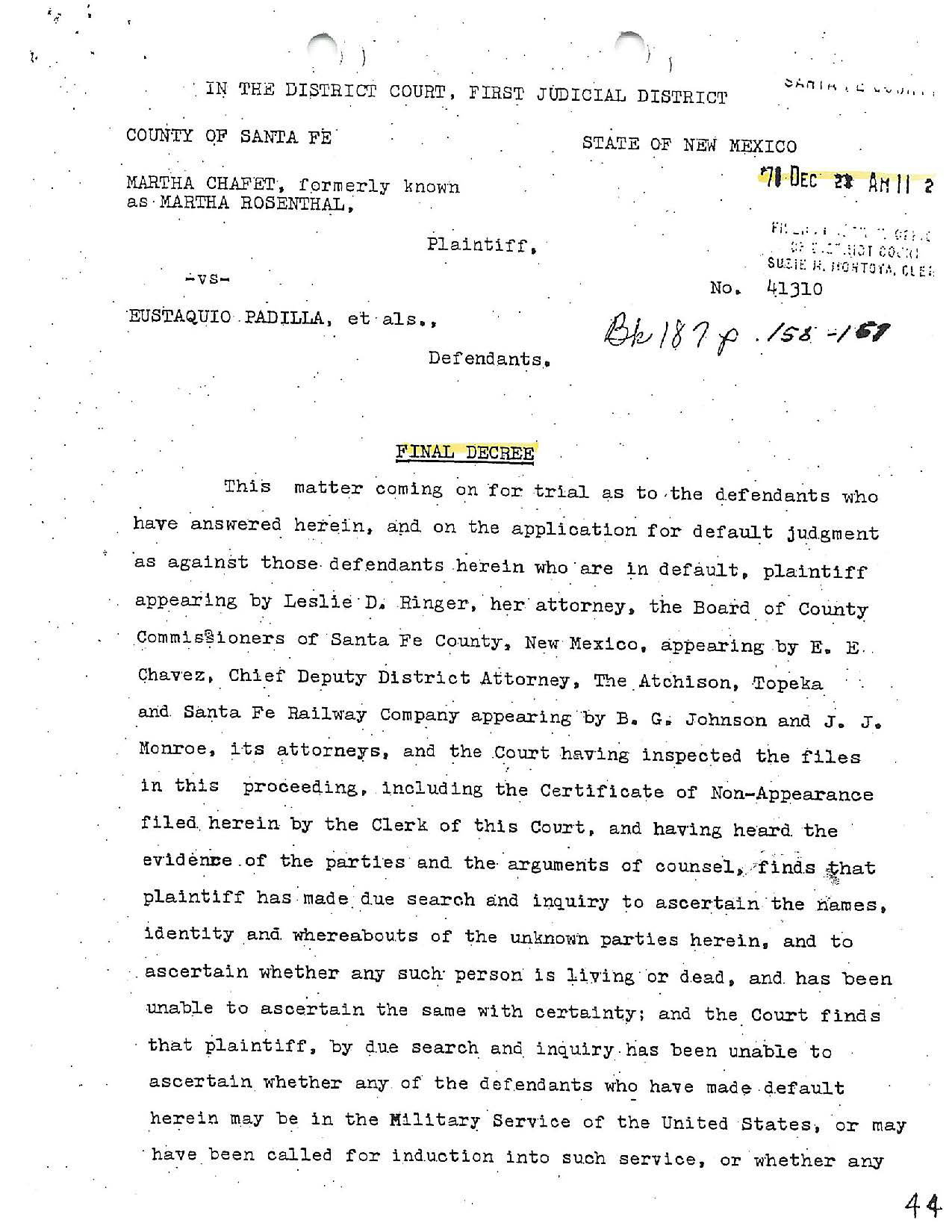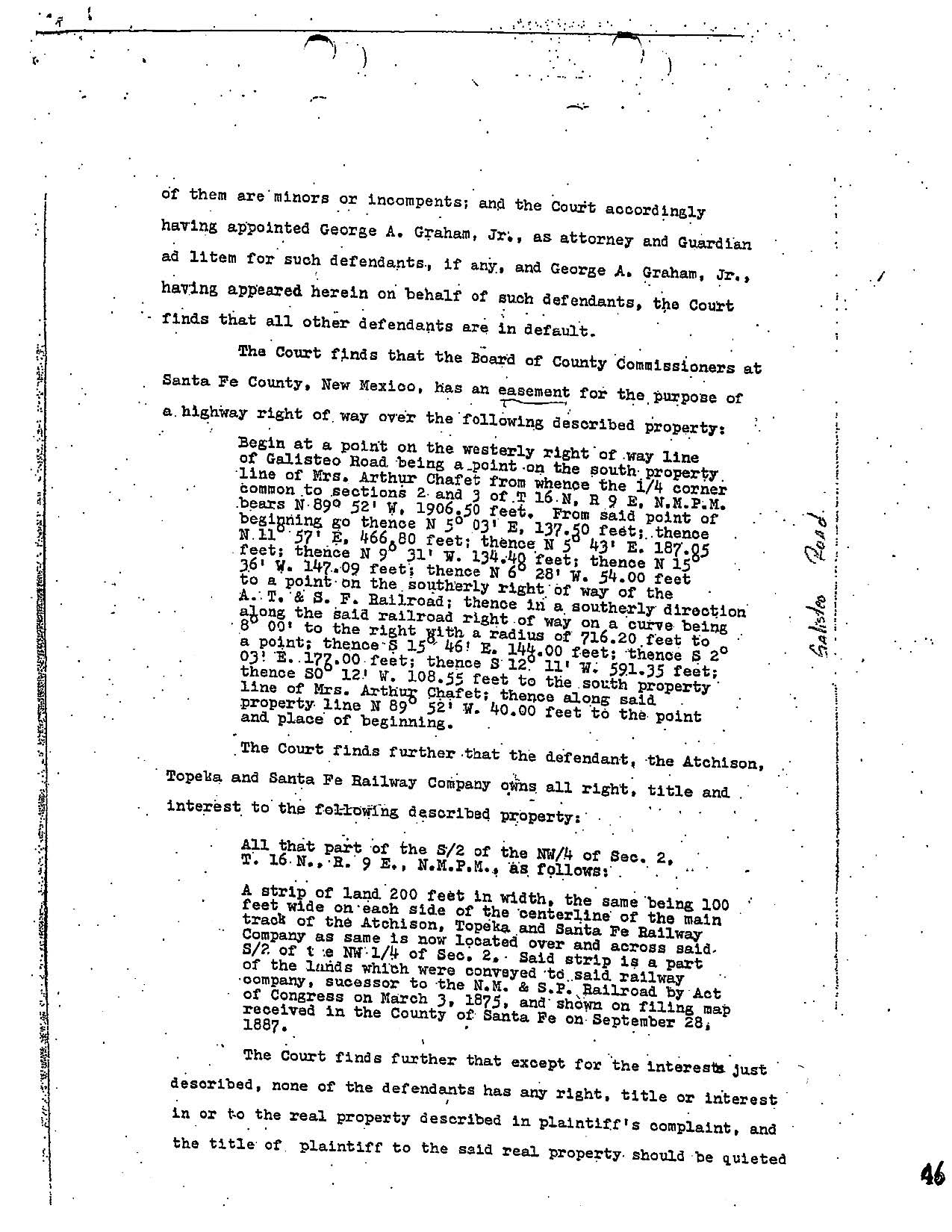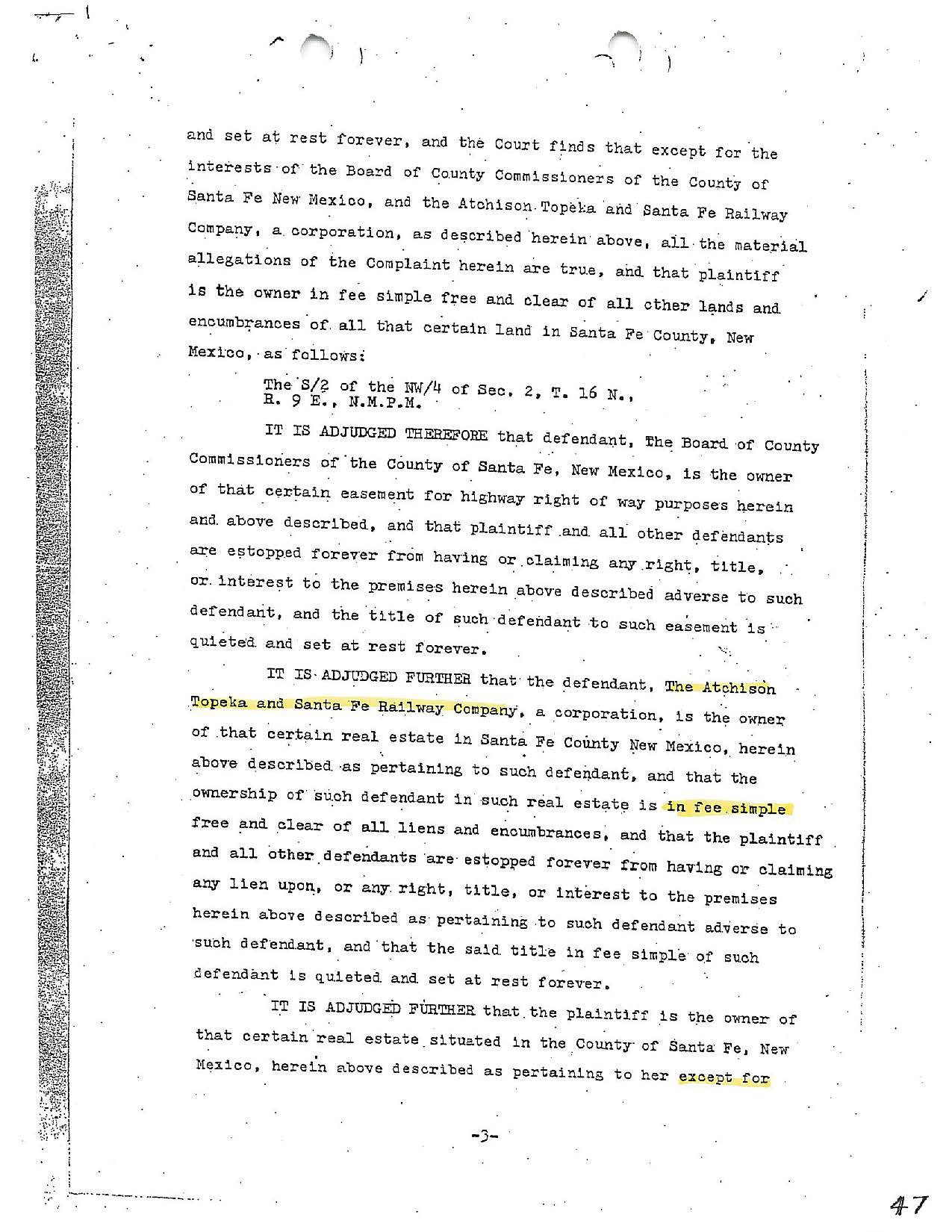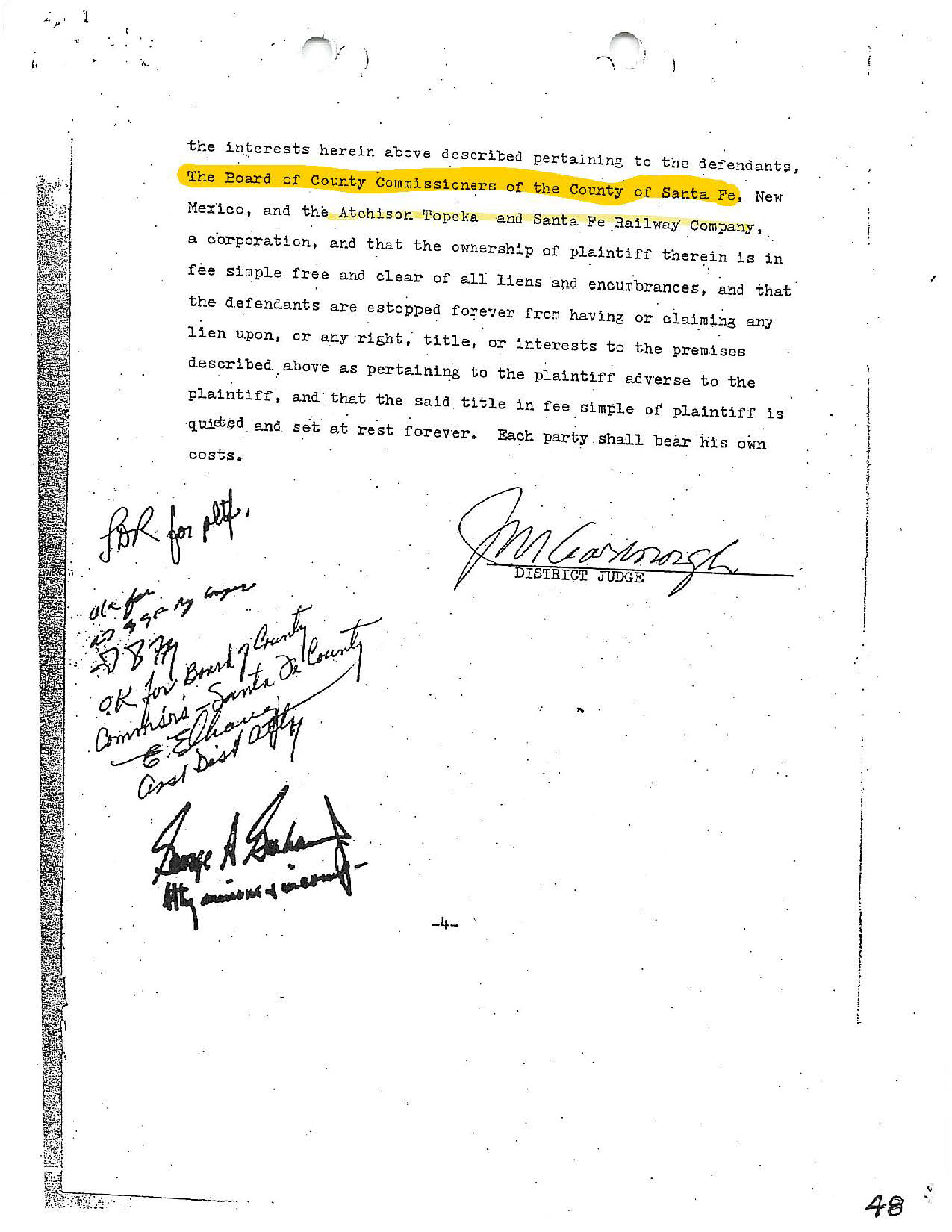Case #2021-4647. Zia Flats Final Development Plan (Zia Station, Phase 1A). Santa Fe city planning commission review 4/7/2022 and Case # 2021-3662. Zia Station Right of Way Vacation and Dedication Plat. Santa Fe city planning commission review 4/7/2022 passed by unanimous vote.
See galisteoroad87505.com 2022 final development plan page for arguments about fatally flawed applications based on lack of proof ownership of subject property and defect in title.
Alternatively, the following facts and arguments apply.
Developer's lack of deed showing Galisteo Road as an easement on their property means a conveyance / deed to developers or quiet title suit or other judgment is necessary to transfer title of Galisteo Road land to developers.
In Piedra Inc v. New Mexico transportation commission, 2008-NMCA-089, the NM transportation commission conveyed a state road to the county. No conveyance was necessary for another road, this one across Okay Owinge land. The pueblo had given right of way to the state for this road, previously. The pueblo had reversionary rights, obviously, because the state never owned pueblo land according to established federal law (nobody besides the tribe ever owns native land), the road was created by merely an easement/right of way granted by the pueblo, running on pueblo land. City has asserted it owns Galisteo Road (res. 21-039) and thus has authority to dispose of its real estate via a deed; it is not required to sell real estate for cash, via NMSA §13-6-2 and §67-2-6,7. However, NM const. sec. 9 art 14 (anti-donation clause) prohibits donation of city property to private entities. Absent a deed, developers, as abutting property owners have a rebuttable presumption of title to the midpoint of the road. However, such title must be obtained via a court judgment such as a quiet title suit or other adjudication, Parr v. Worley, 93 N.M. 229 (1973) (definition of rebuttable presumption), Blain v. Staab, 1901-NMSC-008 (title of road land awarded to present abutting land owner upon city vacation, based on his predecessor in interest having granted easement to the city for use as street). ABSENT EITHER JUDGEMENT AWARDING TITLE, OR DEED, DEVELOPERS DO NOT OWN GALISTEO ROAD AND CITY ISSUING A PERMIT AND ALLOWING BUILDING ON IT VIOLATES THE NM CONSTITUTION ANTI-DONATION CLAUSE. The value of developers' land which they propose to dedicate to city is not equivalent to perpetual use of Galisteo Road land for high density apartments. Further, allowing developers to build on the land violates city regulations and policy to require building permits be applied for and issued only by owners of the property. First, the value of said developers' land is zero, since the city can obtain it for free via the dedication procedure, as developers have indicated they propose to do. Alternatively, developers have admitted to the apartments being a profit making venture. In their application for preliminary development plan and re-zoning and elimination of the south central highway corridor, they asserted and Jennifer Jenkins testified that three stories density apartments was required to make a profit.
Further, although private citizens cannot intervene in quiet title suit or other civil action, any failure of the city to rebut the presumption that developers have reversionary rights in a quite title suit or other civil action makes its and the city council members who vote for this, decision public. Facts and law establish that developers presumption of reversionary rights is rebutted. The rule that a conveyance of land bounded by a highway or railroad carries with it the fee to the center thereof, subject to the easement, is conditioned upon the grantor owning the fee in the land subject to the public easement. 11 C.J.S. Boundaries § 35, p. 580. Except where there is evidence to the contrary, where it is shown that certain property belongs to a particular person, the law presumes that the ownership remains unchanged. Vidmer v. Lloyd, 193 Ala. 386, 69 So. 480; 31 C.J.S. Evidence § 124, p. 743. Zia Station LLC does not have reversionary rights to Galisteo Road because no deeds from Martha Chafet conveying abutting property (which developers bought) specified Galisteo Road as a boundary, see county records, 667 450, 799,257; 823,737; 1241,22; 1328,851. Neither did quit claim deed from Harris and Louis to J&J Santa Fe Land LLC, 1510 371, specify same (assuming arguendo said title is not defective for lack of deeds from Martha T. Chafet to Chafet trust, and from Chafet trust to Louis and Harris). For the same reason, the quit claim deed, 1940 836-839, conveys no interest. Although the deed from J&J Santa Fe Land LLC to Zia Station LLC mentions Galisteo Road as a boundary, grantors were not awarded that designation from Chafet trust, and survey points are identical to the Martha T. Chafet trust deeds. In addition, Harris and Louis provide no proof that they are Chafets sole heirs, or any heirs at all. There is no probate case for Martha T. Chafet in Santa Fe county records. Parr v. Worley, 93 NM 229 (1979).
Further, although private citizens cannot intervene in quiet title suit or other civil action, any failure of the city to rebut the presumption that developers have reversionary rights in a quite title suit or other civil action makes its and the city council members who vote for this, decision public. Facts and law establish that developers presumption of reversionary rights is rebutted. The rule that a conveyance of land bounded by a highway or railroad carries with it the fee to the center thereof, subject to the easement, is conditioned upon the grantor owning the fee in the land subject to the public easement. 11 C.J.S. Boundaries § 35, p. 580. Except where there is evidence to the contrary, where it is shown that certain property belongs to a particular person, the law presumes that the ownership remains unchanged. Vidmer v. Lloyd, 193 Ala. 386, 69 So. 480; 31 C.J.S. Evidence § 124, p. 743. Zia Station LLC does not have reversionary rights to Galisteo Road because no deeds from Martha Chafet conveying abutting property (which developers bought) specified Galisteo Road as a boundary, see county records, 667 450, 799,257; 823,737; 1241,22; 1328,851. Neither did quit claim deed from Harris and Louis to J&J Santa Fe Land LLC, 1510 371, specify same (assuming arguendo said title is not defective for lack of deeds from Martha T. Chafet to Chafet trust, and from Chafet trust to Louis and Harris). For the same reason, the quit claim deed, 1940 836-839, conveys no interest. Although the deed from J&J Santa Fe Land LLC to Zia Station LLC mentions Galisteo Road as a boundary, grantors were not awarded that designation from Chafet trust, and survey points are identical to the Martha T. Chafet trust deeds. In addition, Harris and Louis provide no proof that they are Chafets sole heirs, or any heirs at all. There is no probate case for Martha T. Chafet in Santa Fe county records. Parr v. Worley, 93 NM 229 (1979).
Disposing of roads is a quasi-judicial action, Phillips Mercantile Co. v. City of Albuquerque, 60 N.M. 1, 13, 287 P.2d 77, 85 (1955), overruled on other grounds by Wheeler v. Monroe, 86 N.M. 296, 523 P.2d 540 (1974); City of Albuquerque v. State ex rel. Village of Los Ranchos de Albuquerque, 111 N.M. 608, 613, 808 P.2d 58, 63 (Ct. App. 1991) (“Generally, the courts will not inquire into the wisdom of legislative or executive decisions, or substitute their views for those of other departments or entities.”). However, said actions are limited by constitutional considerations, Phillips Mercantile, 60 N.M. at 13; and, “except as may be restricted by constitutional provisions, ‘the legislative power is practically unlimited’” Gallegos v. Conroy, 38 N.M. 154, 161, P.2d 334, 339 (1934), cited in Piedra, 2008-NMCA-089 ¶18. In addition, Sec. 13-6-2 is derogation of common law against disposing of public roads, so its requirements for factual finding of abandonment, public nuisance, or public health threat must be strictly construed.
Nearby landowners constitutional right to prevent Galisteo Road being vacated and title transferred to private developers.
The public has U.S. const. amend. 5,14 due process rights to retain the original Galisteo Road. These rights protect the non-consenting citizens nearby property rights. This is based on the road being public. “An ordinance having the effect of diverting the streets from a public to a private use or of unreasonably appropriating them to a public use other than that of ordinary travel by pedestrians and vehicles is ultra vires and void. 19 R. C. L. 1149, 1150, Municipal Corporations, sec. 424, citing Perry v. New Orleans, etc., R. Co., 55 Ala. 413, and innumerable authorities thereunder cited”, 19 R.C.L. 782, 785 Municipal Corporations, sec. 91; 19 R.L.C. 1149 Municipal Corporations, sec 425; 13 R.C.L. 251 Municipal Corporations, sec. 208, 209. City of Stillwater et al. v. Lovell et al., 15 P. 2d 12 (1932). See also Bownes v. Winston County, 481 So 2d 362 (1985), citing Booth v. Montrose Cemetery Assoc., 387 So. 2d 774 (1980), (same); Gavin, 366 So 2d 692 (1978).
N.M. const. art. 9 sec.14, anti-donation clause restrictions on quasi-judicial power.
Via approving the preliminary development plan and resolution 21-039, and if the final development plan is approved, the city allows developer to build on the present day Galisteo Road without any compensation. Because no deed is proposed conveying the present day Galisteo Road to developer, and because developers have not been awarded title via court judgment (proved reversionary rights), city will retain ownership of it. Neither the United States nor a state has power to convey its land except as authorized by legislative act. [Sec. 13-6-2] City of Springfield v. United States, 99 F.2d 860 (1st Cir.1938), cert. den. 306 U.S. 650, 59 S.Ct. 592, 83 L.Ed. 1049 (1939). Cited in 2 Patton and Palomar on land titles 3d ed. part 2 ch. 8 Sec. 417 titles deraigned from municipalities, fn. 17. A deed is required to convey land. Ordinance directing city to convey certain property was not itself a conveyance. City of Bowling Green v. Board of Ed. of Bowling Green, 278 S.W.2d 726 (Ky. 1955), citing Morgan v. Big Woods Lumber Co., 198 Ky. 88, 249 S.W. 329 “the title to lands cannot be transmitted by the mere intention to do so, evidenced by the mere making of a plat.”
